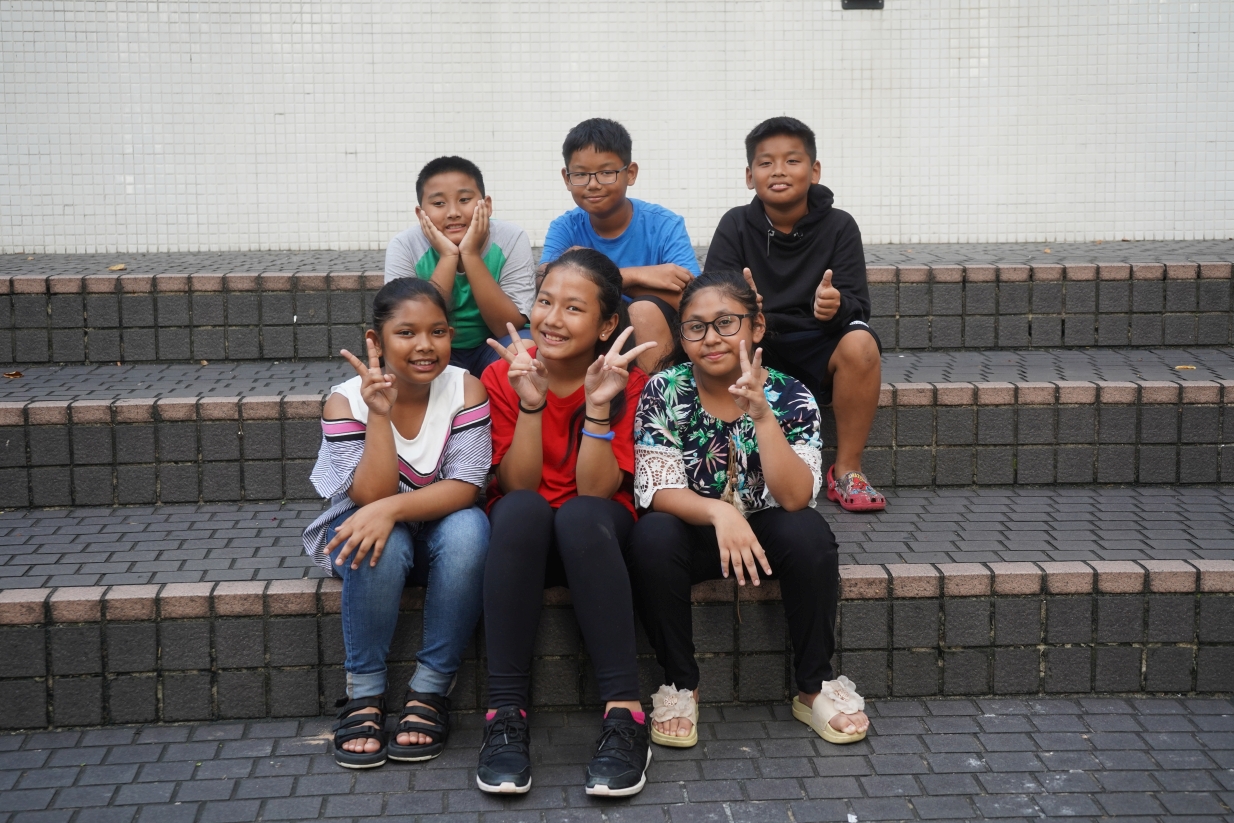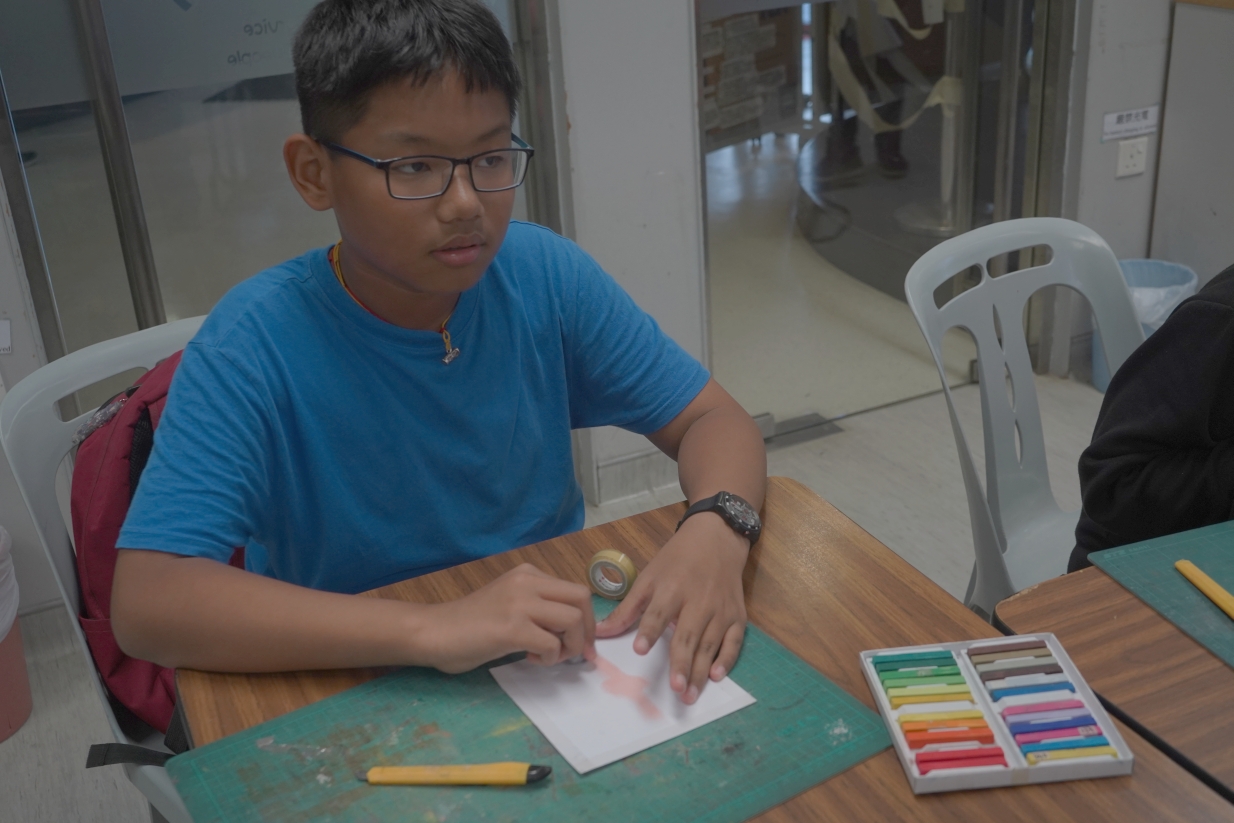Story
Promoting social inclusion
In an activity room at The Salvation Army Yaumatei Integrated Service for Young People, a group of children are doing Pastel Nagomi Art that helps to express their feelings and they have a jovial time drawing and playing around. These children are labelled ‘ethnic minorities’, or more commonly ‘South Asian’, by the mainstream society in Hong Kong, simply because of their different appearances, skin colours and ethnic backgrounds.
Ethnic minorities in Hong Kong
Aged between 10 to 12, Manish, Afifa, Sabah, Prames, Buddha and Debta are raised in Hong Kong and speak fluent Cantonese. Nevertheless, because their parents are Nepalese, Indian or Pakistani, and they look different from most people in Hong Kong and they are often labelled as ‘ethnic minorities’ or ‘South Asian’. ‘“Ethnic minorities” are referring to people like us,’ said Manish.
According to the demographics of Hong Kong in 2016, approximately 80,000 people of ethnic groups are South Asian, consisting mainly of Indian, Nepalese and Pakistani. Although many ethnic minorities people are born and raised in Hong Kong and speak fluent Cantonese, the mainstream society still holds a different view on them. They are not very good at reading and writing Chinese, and sometimes they may get teased by their classmates because of their skin colours. Afifa shared her experience, ‘Once when Manish and I were going home by MTR, a lady whom we didn’t know pointed at us, saying we were dirty as she thought we don’t clean ourselves nor wash our hands.’ Manish added, ‘She didn’t even know us. How could she say we are dirty? Anyone who walks on the street will get dusty somehow. Everyone’s just the same. We decided to ignore her and not to give her any response.’
We are all the same
These children, just like all of us, are concerned about things happening in Hong Kong and would walk into the community. Led by Ms Che, social worker from The Salvation Army Yaumatei Integrated Service for Young People, they volunteered to pick up litter on Tung Lung Island, had the cardboard picking-up experience in Yaumatei, and conducted interviews with electioneering team members of Legislative Council by-election candidates. Through these activities, they get in touch with the community and get a better understanding of social issues in Hong Kong. These children also keep abreast of the recent social controversies - they discuss the issues and are saddened by some scenes on the news clips. Trying to learn more about the current situation, they also went out, accompanied by social workers, to see for themselves what happens around.
Who would have thought that these ethnic minority children, who felt alienated in the city a few years ago, would become so enthusiastic about Hong Kong? ‘These children were born and raised in Hong Kong, but at the beginning they didn’t consider themselves Hongkongers. They were reluctant to speak as they were not good in Chinese. Through the services of our Centre, Chinese training and identity recognition activities, they have a better understanding about Hong Kong and develop a sense of belonging to the city. Now they are willing to take the initiative to pay attention to things about Hong Kong, acknowledging that they have the same obligations and rights like others. For example, after Typhoon Mangkhut ripped through Hong Kong last year, they suggested going out to clear up the streets. I was deeply touched by this,’ said Ms Che.
These children regard themselves as true Hongkongers. They love the city, they like the food here, they like McDonald’s and they like the country parks. They hope Hong Kong will continue to be a nice place with beautiful nature environment. ‘We hope people in Hong Kong will stop damaging the environment, and that they will stop discriminating us, because we are just the same as them. We hope that together we can safeguard the things that we have in Hong Kong, making it a better place.’
Ethnic minorities demographics
According to the 2016 Population By-census of Hong Kong, approximately 92% of the population is Chinese (ethnically speaking, Han Chinese). About 584,383 people, accounting for about 8% of the population, identified themselves as non-Chinese, among which they are mainly Indians, Pakistanis and Nepalese, whose population has increased by over 70% over the past 10 years. Today, many ethnic minorities people are born and raised in Hong Kong and speak fluent Cantonese. However, they are still given the labels of ‘ethnic minorities’ or ‘South Asian’ and are not getting enough support from the community.
The Salvation Army support services
The Salvation Army Yaumatei Integrated Service for Young People and Tuen Mun East Integrated Service for Young People provide assistance to the ethnic minorities. The former focuses on growth and counselling, fostering a sense of belonging to Hong Kong among the ethnic minority group and helping them adapt the life in Hong Kong. The Centre offers trainings on Cantonese and Chinese, guiding them to better understand the Hong Kong society and explore with them their personal and social identities. Tuen Mun East Integrated Service for Young People focuses on community education. By exploring and developing the talents of ethnic minority teenagers and providing them with performance opportunities, the Service facilitates their inclusion in the community and allows opportunities for community to better understand of them. Life planning service is also provided to help them find their way ahead.









